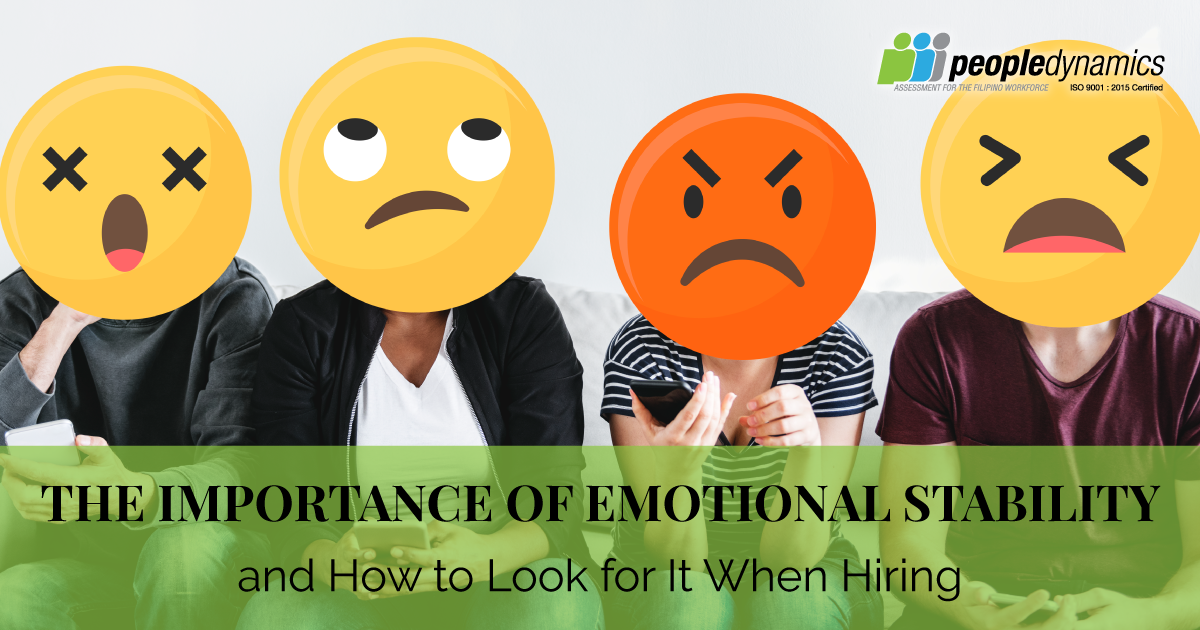In a global health crisis, everyone is vulnerable to mental distress. The sense of uncertainty constantly present during the COVID-19 pandemic leads to anxiety, and this anxiety leads people to fear. Emotions are powerful. They influence your thoughts, decisions, and behavior. And with the pandemic looming over our heads, emotions can go haywire. That’s why, during these times, the importance of emotional stability shines.
What is emotional stability?
Emotional stability refers to a person’s ability to remain stable and balanced. Having emotional stability means that you can withstand the whirlwind that life throws your way, and still be productive and capable through it.
As we said above, emotions are so powerful that they influence your thoughts, decisions, and actions. How? Imagine this: you just won the lottery. You feel ecstatic, excited, and incredibly happy. You can’t believe this is actually happening. Because of your feelings, you think that the world suddenly seems so much brighter. And since you just won the lottery and you’re all merry, you decide to buy some things that you’ve been wanting to get ever since. So you go to the store and splurge.
See what happened in the situation above? That’s a basic example of how can emotions influence you. And this doesn’t only happen with positive emotions. Negative emotions do the same. In the news, there are numerous people claiming that their visions dimmed—nagdilim ang paningin—because of extreme anger that led them to commit crimes. There’s even a term for these kinds of incidents—crimes of passion.
Take note though that emotional stability doesn’t mean that you ignore or suppress your emotions. It’s acknowledging that whatever you feel is there, but still moving forward and being productive despite those. And because of the gravity of the influence of emotions, it’s important to not be swept away with it, and be emotionally stable.
Why is emotional stability important?
So, you know what emotional stability is. Here are some advantages of emotional stability that signifies its importance!
Greater ability to focus
Adversities tend to have different effects on people. But when it comes when you least expect it to, often, you feel first before you think. Anxiety and panic set in, preventing you from doing things you should actually do.
But when you’re emotionally stable, you can maintain your focus no matter how difficult or challenging things may become. You prevent your emotions from controlling you therefore you stay in control. You can think and analyze the situation better, allowing you to come up with a solution.
Confidence
Rejections and criticisms are an inevitable part of life. No matter what you do, you can’t please everybody. Still, it doesn’t mean that you can’t feel down or get hurt when you do receive them. However, when you’re emotionally stable, you feel more secure about yourself. Despite the pain, you won’t allow it to stop you from reaching your goals. You have the confidence to move forward.
Have a positive outlook
A positive outlook is essential in times of uncertainty. When you’re placed in an uncertain situation, you’re removed from your “safe” zone. When this happens, you feel anxiety, doubt, and fear. These emotions tend to make you think about the worst things that could happen.
Having emotional stability can prevent you from drowning in negative thoughts, and instead, have a positive outlook and hope for the situation. A hope that whatever you’re experiencing right now shall pass, and a positive outlook that you can overcome the challenge that you’re currently facing.
Keep you healthy
Poor physical health can affect your mental and emotional health. But at the same time, poor mental and emotional health can also affect your physical health. For example, the known symptoms of COVID-19 such as shortness of breath, fatigue, and aches and pains, can also be caused by anxiety.
In these times where your health is your most important asset, keeping yourself (and your employees) healthy is crucial. When you are emotionally stable, you lessen the risk of your emotions wreaking havoc to your physical and mental health.
How can you look for emotional stability in your talents?
Now that you know the importance of emotional stability is, you want to look for talents that are emotionally stable. How can you do that?
Interview Questions
The great thing about interviews is that it could be so flexible. If you want to look for a certain trait from a talent, you can modify the interview questions so that you could examine a candidate’s response. So, if you want to know if a candidate is emotionally stable, conduct behavioral event interviews (BEIs). BEIs can help you know how a candidate responded when he or she faced adversity in life.
Assessments
Numerous assessments are now available in the market, and with different types and purposes, too. It’s no wonder that there are also assessments to measure a candidate’s emotional stability. For example, we at People Dynamics provides the Emotional Stability (EQ) Profile Assessment, an assessment covering dimension—such as self-esteem or self-respect, happiness or gleefulness, anxiety or worry, obsessiveness or impulsiveness, and more—that are of interest to an employer wishing to make an initial examination of a candidate’s emotional stability-instability.
Adversities and changes are littered throughout life. You can prepare for it, but it can still catch you off-guard. This is where the importance of emotional stability shines. And businesses and organizations also need to look for emotionally stable employees to ensure business continuity, especially during times of crisis.




